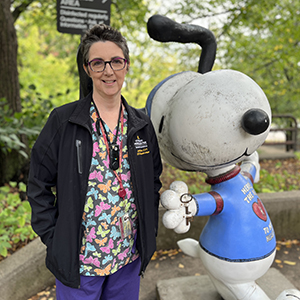-
Apply ByFall Priority: Feb. 1, Final: Aug 1; Spring Priority: Oct. 1, Final: Dec. 1
-
Admission GPA2.5+
-
Total Credits120 (including 30 for admission)
-
FormatPartially online
-
Cost
What Is Health Services Management?
It's the Business Side of Health Care!
Health services managers direct, plan, or coordinate medical and health services in hospitals, clinics, managed care or health insurance companies, pharmaceutical or medical device organizations, long term care facilities, public health agencies, and many more. Health services managers are the business leaders who help run these organizations, working to improve access and delivery of health care services.
Why Choose the U’s Health Services Management Bachelor of Applied Science Degree Program?
- You'll be prepared to lead daily operations, strategic planning, decision-making, policy development, and the administrative and business functions of a health care organization.
- You’ll learn from industry leaders and get hands-on training to work in one of the fastest-growing industries in the country. Instructors teach from experience, draw from real-life case studies, and partner with teaching experts using state-of-the-art teaching methods and technology.
- Our HSM degree program boasts one of the most diverse student populations at the Twin Cities campus, so you'll encounter different perspectives for networking and learning how to lead more equitable health care organizations.
- Courses come in a blended format: in-person, online, and hybrid.
- The U of M Health Services Management Bachelor of Applied Science degree is the only program in the Twin Cities to be certified by the Association of University Programs in Health Administration (AUPHA).
This program is also offered as a minor and certificate.
Career Outlook
Health care continues to be one of the largest areas of growth in the United States.
- 28% job growth for health service managers 2021–2031
- $101K median annual wage for Minnesota health service managers in 2023
An undergraduate degree in Health Services Management prepares students for entry-level positions and opportunities in:
- medical office and clinic management
- health system management
- patient accounting and billing systems
- facility and supply chain management
- long-term care and managed facility administration
- medical and pharmaceutical sales
- human resources
- care coordination, quality and patient safety
- marketing and community relations
Source: Burning Glass Technologies: Program Insight™, accessed 8/10/21.
Health Services Management Courses
Our curriculum is designed with your success top-of-mind, with practical instruction in the areas of evidence-based leadership; management; communication and collaboration; strategic and business planning; innovation; and ethics and responsibility, while addressing the diverse needs of health care organizations. See Student Learning Outcomes for details, and read more about the program in the Course Catalog.
Work with your program advisor to construct a plan with 120 semester credits in the following course sectors, including 76–79 within the major. See what a four-year plan might look like.
Foundation Courses (18–21 credits)
Students can apply to the program after completing at least 30 transferable college credits. These count toward your 120 credit total. When taken at the University, these foundation courses include:
- Introduction to Financial Reporting (ACCT 2051 or APEC 1251)
- Public Speaking or Interpersonal Communication (COMM 1101)*
- Introduction to Statistics (EPSY 3264, STAT 3011, PSY 3801, SOC 3811, or BA 2551)**
- Microeconomics (ECON 1101 or APEC 1101)***
- Health Science Terminology (PHAR 1002)
- Personal and Community Health (PUBH 3001)
- Spreadsheet Skills (APEC 1201 or BA 2051)
* Fulfills Civic Life and Ethics Liberal Education requirements
** Fulfills Mathematical Thinking Liberal Education requirements
*** Fulfills Social Science and Global Perspectives Liberal Education requirements
Core Courses (36 credits)
Students should consult with their advisor about which core classes to take before others.
Health Information Science Options
Choose one
General Courses (41–44 credits)
Your plan will also include general Liberal Education and Writing Intensive requirements, plus lower division foundation coursework in statistics, oral communication, personal and community health, economics, accounting, and health sciences terminology.
While you can transfer credits from other institutions, 30+ of your 120 credits (at a GPA of 2.5+) must be at the U of M, including 24 after admission.
Learning Abroad Option
You may have the opportunity to study abroad as part of your degree.
- Learn more about learning abroad as an HSM student.
- Find out about our exciting Costa Rica trip.
Still have questions? Talk to enrollment advisor Jeff Olsen Krengel for more information.
Long Term Care Administration
Our Long Term Care (LTC) administration programs provide experience and education to support Minnesota and Wisconsin licensure as a long term care (nursing home) administrator. We follow state licensing rules about the content to be covered, and our courses are approved by the state licensing boards.
Our Health Services Management program is the only one in Minnesota accredited by the National Association of Long Term Care Administrator Boards for the Health Services Executive license.
Admission Requirements
Before You Apply
The Health Services Management degree welcomes students who have completed at least 30 college credits, which will count toward your 120-credit total. You can apply if you don’t have 30 credits completed yet, but you should first talk to our admissions advisor.
Ready to apply? Here's what we're looking for:
- 30 transferable credits
- 2.5+ GPA
- Demonstrated interest in HSM field
We also look to see if you have:
- A pattern of steady academic improvement
- Nonacademic experience in a related field
- Work experience, paid or unpaid
- Extenuating circumstances (events or issues that may have affected your progress in school)
The University also reserves the right to deny admission to an otherwise admissible applicant if the University determines that the applicant's enrollment would not be in the applicant's or the University's best interest.
Transfering Credits
Wondering if Your Credits Will Transfer?
Current U of M Students: Run a "What if" APAS report to see how your coursework might meet the Health Services Management program requirements.
Non-U of M students from a local community college: Sometimes Construction Management foundation courses can be taken at a community college. To find out if your college’s courses transfer to the HSM major, consult the CCAPS Transfer Admissions Guides.
Non-U of M students from a four-year institution: Visit the Transferology website, a free, web-based system that provides access to up-to-date information about how your courses will transfer and apply to a degree program at the University of Minnesota Twin Cities. (You will need to create a free Transferology account.)
Additional Resources
Have a specific question? Contact a transfer admissions counselor to talk about your individual coursework.
Transfer Admission Advising
Current UMN Twin Cities Students
If you are a current UMN student and want to transfer to CCAPS, contact CCAPS transfer specialist Jeff Olsen Krengel.
New UMN Twin Cities Students
If you have credits from another institution or UMN campus, contact a transfer specialist in the Office of Admissions.
Apply
The Health Services Management degree accepts applications from students with at least 30 transferable college credits. Find out more about how your credits might transfer in the Transferring Credits section above.
Fall Semester Application Deadlines: Priority: February 1 | Final: August 1
Spring Semester Application Deadlines: Priority: October 1 | Final: December 1
All applications received by the priority deadline for each term will be considered. Applications received after the priority deadline, up until the final deadline, will be considered on a space-availability basis.
Questions about admission requirements? Contact a transfer admission advisor.
Current Students
Are you a current student of any of the HSM programs? We built a website just for YOU!
We envision the Health Services Management website to be a one-stop shop for all your academic needs. From the website, you can:
- contact your instructors and advisors
- browse the academic calendar
- access essential forms and docs (e.g., Directed Study and Leave of Absence)
- explore internships and career opportunities
- apply to the study abroad program
- and a whole lot more!
Frequently Asked Questions
What Is Health Services Management?
Health services managers direct, plan, or coordinate medical and health services in hospitals, clinics, managed care or health insurance companies, pharmaceutical or medical device organizations, long term care facilities, public health agencies, and many more. Health services managers are the business leaders who help run these organizations, working to improve access and delivery of health care services.
One of the many duties of health services managers is to find ways to improve healthcare services access and delivery. Other responsibilities might include:
- goal setting; strategic planning
- recruiting and training staff; human resources
- equity, inclusivity, and diversity initatiatives
- managing finances; budgeting
- quality improvement; compliance
- innovation; project management
Health services management training allows you to become a leader in the healthcare field. You can focus on shaping healthcare policy, promoting equity and inclusion in the healthcare industry, managing healthcare delivery, or being a leader in another area of health services. It’s your choice!
What Can You Do with a Health Services Management Degree?
With a Bachelor of Applied Science in Health Services Management (HSM) from CCAPS, you can build a business leadership career in the healthcare industry. You can use your degree to find management jobs in hospitals, private practices, long-term care facilities, home health, and hospice organizations. You’ll also be ready for a career working with mental health providers, managed care or health insurance companies, biotechnology organizations, or pharmaceutical organizations. With this degree, you can also explore career opportunities in health services management at government or public health agencies.
What Skills Are Useful in Health Services Management?
In CCAPS’s health services management bachelor’s degree program, you can expect to build the business skills needed for a fulfilling career. Some of these skills include: leadership, communication, teamwork, problem-solving, time management, and decision-making. Health services managers develop and use these kinds of skills on a daily basis to enhance their organization's operations.
Health services managers should also have strong analytical, research, budgeting, project management, staff management, and business administration skills. Other important skills include quality assurance and control, data collection, operations management, and organizational skills. Health services managers are also skilled in promoting diversity, inclusion, and equity in healthcare access and delivery. You’ll have a chance to practice each of these in our HSM program.
What are the Education Requirements to Become a Health Services Manager?
In most cases, health services managers will have at least a bachelor’s degree.
What are the main courses in the HSM degree program?
The core courses in this degree program include:
- Health Care Delivery Systems
- Human Resources in Health Care Settings
- Health Care Finance
- Inclusion and Equity in Health Care Management
- Health Care Quality and Patient Safety Management
- Health Care Administration and Management
- Health Care Law and Ethics
- Leadership and Business Planning
Students in CCAPS’s HSM program will also complete an Internship that allows the student to explore careers and job roles while putting in practice their learned skills.
How Can I Customize My Health Services Management Education?
The U’s Bachelor of Applied Science in Health Services Management degree can be customized to better fit your career goals and interests. Our advisors help students choose the right blend of courses for this undergraduate degree program. As a student, you can count on your advisor to provide you with support, guidance, and practical information about our university and program.
Your HSM degree can be customized to focus on areas including:
- health care information science
- project management
- health care economics
- health care leadership & management
- health data analytics
- marketing
- finance
- health system administration
- health and wellness
- cultural diversity
- addiction studies
- public health
- and many others!
You’ll need at least 22 credits in these elective options to customize your degree. Your advisor can provide you with guidance in choosing your electives and other courses.
Sources
What Medical and Health Services Managers Do (US Bureau of Labor Statistics)
How to Become a Medical or Health Services Manager (US Bureau of Labor Statistics)
Request Program Information
Do you want to see:
- reminders of application deadlines?
- financial aid tips?
- announcements of new scholarships?
- stories about key faculty?
- highlights on core courses?
- snapshots of how other students put their courses to work on the job?
- other news about the program and health service management industry?
Great! Sign up for periodic updates here!






